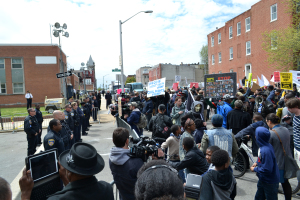
On May 19, Maryland Gov. Larry Hogan will sign SB1005, the Justice Reinvestment Act, into law. The criminal justice reforms contained within this bill are a significant step forward for Maryland, a hyper-politicized state close to Washington, D.C.’s powerbrokers in both proximity and connections. Many parts of this legislation will improve public safety, lower the crime rates in Maryland’s communities, while also reducing the harm of mass incarceration — but no mere reform can alter the violent cycle of crime and punishment that unfolds daily in capitalist America.
Political landscape
Despite the hard work of many advocates and advocacy organizations present in the capitol, Maryland has up till now very little reform of its criminal justice system. It’s a divided state, with Democratic majorities in both bodies of the General Assembly and a Republican governor—who has the second highest approval rating in the country.
This has created a tough path forward for many organizations, advocates, and legislators who want to see big changes, and in the case of the Justice Reinvestment Act, it blunted what could have been a more significant piece of legislation.
What does the law do?
What did get through the conflicted General Assembly and successfully to the governor’s desk for signing is still a significant package. Significant mandatory minimum reform is one of the biggest and most exciting changes—mid- and low-level drug dealers (not the traffickers or kingpins) no longer have stringent minimums that for most drugs were set at 10 years for 2nd-time offenses, 25 years for 3rd-time offenses, and 40 years for 4th-time offenses. Those are gone, and with lower maximums. The dollar threshold for theft to be considered a felony, increasing exposure to longer prison terms, was raised from $1,000 to $1,500.
Among many other changes in an over-100-page bill, returning citizens who are finishing their sentences on community supervision such as probation or parole will now be eligible to go on inactive supervision earlier, and once there they will no longer pay fees. There also is now eligibility for a state-funded independent medical assessment to receive medical parole. Geriatric parole is expanded to include those who are 60 years old, a group of people studies show are highly unlikely to ever commit crime again.
And there is potential for real sea change within state agencies. Under this law, state arms that administer community supervision such as probation and parole will be more proportionate and predictable with sanctions. This means that when someone misses a probation appointment, reporting requirements would be increased rather than letting the person miss 10 appointments and then sending him back to court—where he potentially could be sent back to prison for years.
The Act also sets up studies and data collection that will continue to reap benefits into the future, including assessing restitution processes, barriers to employment and drug and mental health services—what’s currently offered and what’s needed.
Not a forever fix
These are good reforms that will positively impact many people in Maryland. But can these reforms to the system create real and lasting change leading to truly plummeting crime rates in both cities and rural areas? Will it usher in a new era in which people who engage in anti-social behavior can be compassionately set on the right path instead of punished? Will it eliminate state violence in the form of prison guards and police brutality? In order for these goals to be accomplished, we need socialism.
Under socialism, the workers hold the power, not the owners of corporations and companies who don’t do the work. We would plan for what we need as a society, rather than planning for what makes money. This would mean rights to jobs and an income, which would eliminate much if not all of the individual crimes of theft that occur under capitalism.
It would mean the elimination of the underground economy as a means of survival for those kept out of the mainstream workforce—ending drug wars and all the homicides and other violence that come with it.
With guaranteed health care that everyone can access, mental health problems in children and parents will be handled with all of modern medicine’s advances and everyday workers will be able to afford family therapy, childcare, and proper food. This too will dramatically reduce many violent manifestations of mental illness and family dysfunction that are currently addressed in the criminal justice system.
And with no brutal capitalist state that kicks people out of their houses for being late on payments, that kills unarmed people in the streets, that oppresses people in prison cages with assaults and solitary confinement, that disproportionally sentences Black and Brown residents to longer sentences and detains people from other countries for looking for a better place to live—then we can eliminate that form of violent crime too.
The reforms in Maryland’s Justice Reinvestment Act are important and will make a big change in Maryland’s sentencing and corrections practices. While fighting for bigger changes, reform work is incredibly vital to the current well-being of people. But socialism would mean sweeping change across our communities, a truly lowered crime rate, a nation without the very highest incarceration rate in the world and basic rights for all people.





